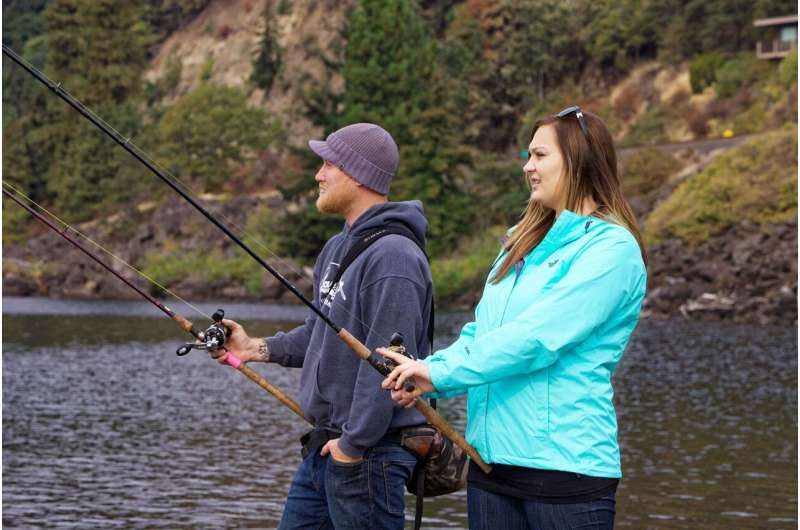This article has been reviewed according to Science X's editorial process and policies. Editors have highlighted the following attributes while ensuring the content's credibility:
fact-checked
trusted source
proofread
Recreational fishermen could be 'untapped allies' in the fight against climate change, research says

Nature lovers tend to be categorized as either "appreciative" or "extractive." The first group includes people like hikers and bird watchers, while the second includes hunters, fishermen and fisherwomen.
A recent study by Northeastern marine biologists says there's an overlap between the two groups that could be the start of a new conversation about protecting the environment—and combating climate change.
The paper, published in Sustainability, looks at the pro-environmental behaviors and attitudes of three groups of people: citizen scientists who count rather than catch fish, recreational fishermen and people who fell into neither group.
It's one of the first times scientists have studied the environmental attitudes of recreational rather than commercial fishermen, lead author Marissa Varade says.
She says citizen scientist fish counters exhibited higher levels of pro-environmental behaviors than either recreational fishermen or individuals who were neither fishermen nor citizen scientists.
But the paper also showed that fishermen who invested more heavily in their sport—in terms of gear and time—exhibited greater pro-environmental behaviors than less specialized fishermen and non-fishers.
"There are lots of different factors that motivate people to have pro-environmental attitudes," says Brian Helmuth, Northeastern professor of marine and environmental science at the Marine Science Center and Center for Coastal Sustainability in Nahant.
"If we only look at this through the lens of an academic, we're going to miss a lot of the reasons why people care about nature," says Helmuth, who also contributed to the study.
"There are all sorts of potential allies out there in finding solutions to climate change. Recreational fishers are one of those that's still largely untapped."
Reframing climate change
The study surveyed self-reported behaviors and attitudes among 400 people in Massachusetts, says Varade, who did the research as a graduate student and currently works for Northeastern's Three Seas program.
The paper also examined the participants' attitudes toward climate change, which the researchers say "is likely to make certain offshore species more difficult, expensive and dangerous to catch" as fish populations move offshore and into deeper waters.
Citizen scientists showed the most concern about climate change, researchers say.
But respondents "overall" showed more concern for the category "environment" than "climate change," according to the study.
"Overall, the environment was a bigger concern for everyone than climate change," Varade says. "Climate change can be a really polarizing word and concept."
The researchers say that framing the conversation as a discussion about healthy ecosystems "may be more effective with some stakeholders than those focused solely on climate change."
"This really shows the importance of starting conversations with where people are—not starting from your own assumptions, or the academic view," Helmuth says, adding, "Can you develop solutions that incorporate what people care about?"
Meet people where they are
The study shows the importance of "meeting people where they are as opposed to forcing one dialogue on everyone," Varade says.
She says citizen scientists fish monitors count fish at places including herring runs.
But recreational fishermen also contribute to citizen science by reporting their catch on smartphones, which helps fisheries management assess population numbers and health.
The more "highly specialized" fishermen are more likely to participate in these behaviors than less serious fishers, Varade says.
Specialized fishermen "dedicate a lot of time, money and effort into participating on a regular basis," Varade says. They invest in gear, spend more time on the water and subscribe to fishing magazines.
People who spend time outdoors feel a special connection to the environment, Varade says.
She says the study "reemphasized research that has previously shown that increased participation in these types of nature based activities can be a really important way to build pro environmental behaviors and climate concerns among participants."
More information: Marissa L. Varade et al, Catching versus Counting: Comparing the Pro-Environmental Attitudes, Behaviors, and Climate Concerns of Recreational Fishers and Citizen Scientists, Sustainability (2022). DOI: 10.3390/su15010307
Provided by Northeastern University




















